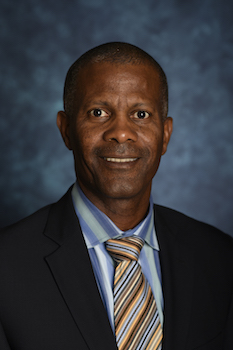 NMSU professor Rolston St. Hilaire, head of the Department of Plant and Environmental Sciences and Interim Head of Extension and Plant Sciences in the College of Agricultural, Consumer and Environmental Sciences was inducted into the American Society for Horticulture Science’s 2019 class of fellows and serves as the ASHS International Division Vice President. (NMSU photo by Carlos Trujillo)Rolston St. Hilaire, head of the Department of Plant and Environmental Sciences, Interim Head of Extension and Plant Sciences and a professor within the College of Agricultural, Consumer and Environmental Sciences at New Mexico State University has been inducted into the American Society for Horticulture Science’s 2019 class of Fellows.
NMSU professor Rolston St. Hilaire, head of the Department of Plant and Environmental Sciences and Interim Head of Extension and Plant Sciences in the College of Agricultural, Consumer and Environmental Sciences was inducted into the American Society for Horticulture Science’s 2019 class of fellows and serves as the ASHS International Division Vice President. (NMSU photo by Carlos Trujillo)Rolston St. Hilaire, head of the Department of Plant and Environmental Sciences, Interim Head of Extension and Plant Sciences and a professor within the College of Agricultural, Consumer and Environmental Sciences at New Mexico State University has been inducted into the American Society for Horticulture Science’s 2019 class of Fellows.
The ASHS was established in 1903 and is recognized around the world as one of the most respected and influential professional societies for horticultural scientists. To be considered for a nomination, nominees must be active with at least 10 years of membership. The number of living and active fellows cannot exceed 10 percent of the eligible membership.
St. Hilaire joined the ASHS more than 20 years ago and has published 134 publications, including 50 peer-reviewed journal articles and one book. He has served as major advisor to 13 graduate students and currently holds a plant patent for “JFS-NuMex 3” bigtooth maple, which can be found in nurseries as Mesa Glow. He earned he Distinguished Research Award from the NMSU College of ACES and the Research Discovery Award from NMSU in recognition for outstanding achievement in research and discovery.
“It’s an honor to be a fellow, I first joined the society as a graduate student back in 1996 and all of these great scientists were the ones that were fellows and you’d look up to them. They were the ones that reached the pinnacle of their profession and had made major contributions to science and the field of horticulture. You read their scientific papers as a graduate student and now to be inducted into that class, I feel so humbled,” St. Hilaire said.
He found about a year ago that a fellow peer had nominated him and the long process would start. Everything submitted for him would have to be looked at by the fellows screening committee team who would vote on whether he should be admitted or not. St. Hilaire found out a month before the conference that he had been chosen.
“To be considered a fellow, your peers have to nominate you. The whole process is very rigorous, after being nominated several of your peers have to write letters in support of you and they have to speak to different aspects of your work over the years. So, not only was my teaching looked at, my research, contribution to the international field of horticulture, my training of grad students both domestically and internationally and my contributions to ASHS were looked at,” St. Hilaire said.
While a new assistant professor at NMSU in 1998, St. Hilaire developed six new courses related to landscape and ornamental horticulture and environmental stress physiology. St. Hilaire has contributed extensively to international horticulture. He has presented research findings at scientific conferences in Canada, Italy, and Mexico, and mentored and/or recruited graduate students from India, Iran, Jordan, Pakistan and Trinidad.
“I’ve had success with recruiting students from abroad. I’ve also traveled and have worked as a consultant in Uzbekistan where I spent a little over three weeks traveling through this central Asian country and consulting with farmers in rural areas to help them find ways to maximize irrigation in small farms. I’ve given talks in Canada and have been to Mexico a few times and plan to go back a few more times,” St. Hilaire said.
Currently, he serves as the ASHS International Division vice president where he oversees professional interest groups that deal with horticulture topics internationally and ensures that there are scientific talks, workshops and oral sessions to provide more information to scientists wishing to learn more about international horticulture.
St. Hilaire is a strong believer in giving back to the community, not just doing the science.
“As scientists we can contribute our time to those societies as an officer or a journal editor or as a moderator of an oral session. It’s always good to give back to the scientific community,” St. Hilaire said. “We have to make sure science stays strong and train our replacements, we need to be there and hold their hands along the way. When I started with ASHS, I was encouraged by peer scientists to join small professional interest groups and if you do a good job you get more responsibilities in a larger setting and eventually you get to be elected as a VP, recognized or elected fellow.”